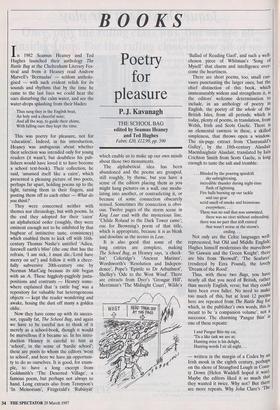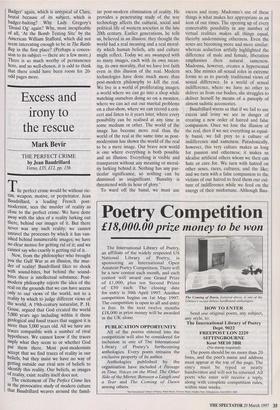BOOKS
Poetry for pleasure
P. J. Kavanagh THE SCHOOL BAG edited by Seamus Heaney and Ted Hughes Faber, £20, ,E12.99, pp. 590 In 1982 Seamus Heaney and Ted Hughes launched their anthology The Rattle Bag at the Cheltenham Literary Fes- tival and from it Heaney read Andrew Marvell's 'Bermudas' — seldom antholo- gised — with such evident relish for its sounds and rhythms that by the time he came to the last lines we could hear the oars disturbing the calm water, and see the water-drops splashing from their blades;
Thus sung they in the English boat, An holy and a cheerful note; And all the way, to guide their chime, With falling oars they kept the time.
This was poetry for pleasure, not for 'education'. Indeed, in his introduction, Heaney was ambiguous about whether their selection was intended only for young readers (it wasn't, but doubtless his pub- lishers would have loved it to have become a school text-book). Their collection, he said, 'amassed itself like a cairn', which presented a pleasing picture of two poets, perhaps far apart, holding poems up to the light, turning them in their fingers, and posting them off to each other — What do you think?
They were concerned neither with themes nor chronology, but with poems. In the end they adopted for their 'cairn' an alphabetical order (roughly, they were eminent enough not to be inhibited by that bugbear of instinctive taste, consistency) which enabled them to kick off with 16th- century Thomas Nashe's untitled 'Adieu, farewell earth's bliss' (the one that has the refrain, 'I am sick, I must die./ Lord have mercy on us!') and follow it with a cheer- fully subversive 20th-century one by Norman MacCaig because its title began with an A. These higgledy-piggledy juxta- positions and contrasts — Heaney some- where explained that 'a rattle bag' was a repository for valuable but heterogeneous objects — kept the reader wondering and awake, hosing the dust off many a golden oldie.
Now they have come up with its succes- sor, equally fat, The School Bag, and again we have to be careful not to think of it merely as a school-book, though it would be marvellous if it became so. In his intro- duction Heaney is careful to hint at 'school', in the sense of tardic school'; these are poets to whom the editors 'went to school', and here we have an opportuni- ty to do so ourselves. It is good, for exam- ple, to have a long excerpt from Goldsmith's 'The Deserted Village', a famous poem, but perhaps not always to hand. Long extracts also from Tennyson's 'In Memoriam', Fitzgerald's 'Rubaiyat' which enable us to make up our own minds about those two monuments.
The alphabetical idea has been abandoned and the poems are grouped, still roughly, by theme, but you have a sense of the editors placing them as you might hang pictures on a wall, one modu- lating into another, or contradicting it, or because of some connection obscurely sensed. Sometimes the connection is obvi- ous. Twelve pages of the storm scene in King Lear end with the mysterious line, `Childe Roland to the Dark Tower came'; cue for Browning's poem of that title, which is appropriate, because it is as bleak and desolate as the scenes in Lear.
It is also good that some of the long entries are complete, making The School Bag, as Heaney says, 'a check- list': Coleridge's 'Ancient Mariner', Wordsworth's 'Resolution and Indepen- dence', Pope's 'Epistle to Dr Arbuthnot', Shelley's 'Ode to the West Wind'. There are extracts from Dyer's `Grongar Hill', Merriman's The Midnight Court', Wilde's 'Ballad of Reading Gaol', and such a well- chosen piece of Whitman's 'Song of Myself' that charm and intelligence over- come the heartiness.
There are short poems, too, small can- vases punctuating the larger ones, but the chief distinction of this book, which immeasurably widens and strengthens it, is the editors' welcome determination to include, in an anthology of poetry in English, the poetry of the whole of the British Isles, from all periods; which is today, plenty of poems, in translation, from Welsh, Irish and Scots Gaelic. There is an elemental rawness in these, a skilled simpleness, that throws open a window. The six-page extract from 'Clanranald's Galley', by the 18th-century Alasdair Macmhaighstir Alasdair, translated by lain Crichton Smith from Scots Gaelic, is long enough to taste the salt and tremble:
. ..Blinded by the pouring spindrift sky unbrightening, incredible thunder during night-time flash of lightning.
Fire balls burning up our tackle and our gear acrid smell of smoke and brimstone everywhere.. .
There was no nail that was untwisted, there was no rivet without unbending, there was no part that still existed that wasn't worse at the storm's ending...
Not only are the Celtic languages well represented, but Old and Middle English; Hughes himself modernises the marvellous 'Sir Gawain and the Green Knight': there, are bits from 'Beowulf, 'The Seafarer (rendered by Ezra Pound), the lovely 'Dream of the Rood'.
Thus, with these two Bags, you have nearly all that you need of British, rather than merely English, verse; but they could have been even fuller. No need to make too much of this, but at least 12 poems here are repeated from The Rattle Bag for which, in the publisher's own words, this is meant to be `a companion volume', not a successor. The charming 'Pangur Ban' Is one of these repeats:
I and Pangur Ban my cat, 'Tis a like task we are at; Hunting mice is his delight, Hunting words I sit all night. ..
written in the margin of a Codex by an Irish monk in the eighth century, perhaps on the shore of Strangford Lough in Coun- ty Down (Helen Waddell hoped it was). Maybe the editors liked it so much that they wanted it twice. Why not? But there are more repeats. Why John Clare's 'The Badger' again, which is untypical of Clare, brutal because of its subject, which is badger-baiting? Why Lady Gregory's 'Donal Og' again? Why, most inexplicable of all, 'At the Bomb Testing Site' by the American William Stafford, which did not seem interesting enough to be in The Rattle Bag in the first place? (Perhaps a conces- sion to its subject — there are a few more.) There is so much worthy of permanence here, and so well-chosen, it is odd to think that there could have been room for 20- odd pages more.



































































 Previous page
Previous page